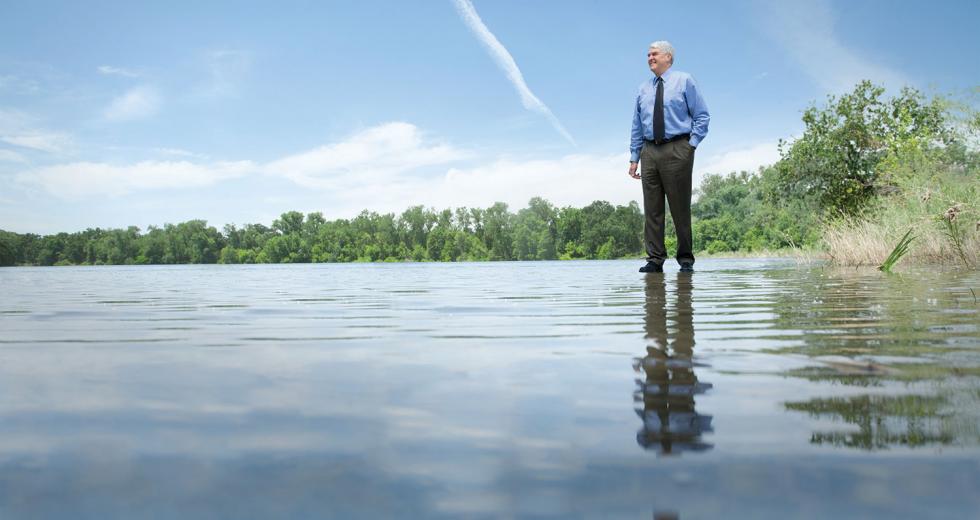Being the bearer of unwelcome news rarely makes you the most popular person in town, particularly when it comes to flood control. But it doesn’t worry David Ford, one of the most trusted figures on California’s sometimes-contentious flood control scene and a man with a knack for speaking what Pulitzer Prize-winning journalist Frank Hagar once called “the truth that men prefer not to hear.”
“I tell my clients to be careful what you ask me, because I’m going to answer the question,” says Ford, 60, founder and president of David Ford Consulting Engineers Inc. “If you’re not prepared for that, perhaps you want to ask a different question or ask another consultant.”
Some folks might view that as a bit of bravado, but from the soft-â?¨spoken Ford it is anything but. Tall and angular, with a shock of silver hair and a hint of twang from his Texas roots, Ford is far more professorial than confrontational. He holds three degrees, including a doctorate from the University of Texas, and has taught at Sacramento State and UC Davis. To him, it just makes sense to shoo off a potential client that wants anything other than the unvarnished truth.
“We see ourselves as a source of information to our clients,” he says. “We’re not going to advocate a position one way or another on their behalf. That’s what attorneys and politicians do.”
Stein Buer, former executive director of the Sacramento Area Flood Control Agency, has worked with Ford on flood control projects in the region. He knows what it’s like to get bad news from Ford.
“He may not always give me the answer I want to hear, but he is going to give me the best, most professional answer there is,” Buer says, who notes that not all consultants share Ford’s integrity.
“Without equivocation, those people exist. It’s not unusual to see such engineers testifying in legal proceedings where lots of money can potentially change hands,” he says. “But with David Ford, we all know he’s going to always tell the truth no matter what his client’s interests might be. That’s easy for someone to say but harder to put into practice.”
While that expectation might seem like a given, flood control projects are not so simple. Every local government and flood control agency says its needs are more important than anyone else’s. Other stakeholders — developers, private landowners or residents likely to be impacted by a flood — also do what it takes to protect their interests. That can mean a lot of pressure on those tasked with getting the job done, particularly if one of those stakeholders happens to be politically connected.
“Whenever you move water, someone’s going to be unhappy,” Buer says.
It makes for a tough environment, one that rarely leaves everybody completely satisfied. But over the course of two decades, Ford’s hydrological engineering expertise and insistence on letting data speak for itself has earned him a reputation among the disparate government agencies charged with keeping Northern California’s rivers and streams in their channels. It has also been the bedrock of a company that has steadily grown from a one-man shop into a thriving small business with 25 employees and more than $5 million in annual revenue.
“We’re not going to advocate a position one way or another on their behalf. That’s what attorneys and politicians do.”
David Ford, founder, David Ford Consulting Engineers Inc.
The irony is that, unlike most entrepreneurs, he never actually planned for it to work out this way.
After earning his doctorate in 1978, Ford planned to teach college. When he didn’t find a position to his liking, he took a job with the Hydrologic Engineering Center in Davis, an arm of the U.S. Army Corps of Engineers. After a decade there, he opened shop in 1989.
Then, as now, he went almost exclusively for government contracts rather than the feast-or-famine world of working for land developers. He planned to work alone, but eventually his desire to focus on the most complex flood management problems made it hard to stay small.
“After a while, I realized that if it’s just you all the time, you can’t necessarily do the projects you want to do,” he says.
Michael Lindquist recalls those days well. Lindquist, now a senior civil engineer for the city of Davis, was Ford’s first hire. While he refers to Ford as a “fantastic mentor,” he says Ford’s insistence on seeking out the toughest jobs and most complex problems was a double-edged sword.
“On the one hand, we always had really challenging and interesting work,” he says. “David absolutely hates to be ‘normal,’ so every project was something unique and new.”
Ford’s insistence on tackling only the hardest problems also created its own challenges, notably a lack of more standard fare, the bread-and-butter jobs so often necessary to pad the bottom line of a fledgling company. And like many entrepreneurs, Lindquist says Ford had significant trouble letting go and fully trusting him and other eventual hires, insisting for years on personally reviewing every piece of work that left the office, or completely rewriting reports that others had done. In that regard, he says the company’s growth is somewhat surprising.
“Something changed along the way,” he says. “David wanted to stay small and nimble, and I thought his control issues would necessitate always having a smaller company where he can keep a really close eye on everything.”
Ford doesn’t deny his intensity, nor does he apologize for it. “We take quality control really seriously in this business,” he says.
But he also says time and a more experienced staff, many of whom he has known for decades, has tempered that need to keep his thumb on everything. He employs no junior-level engineers and lauds the fact that his current crew “has a few more gray hairs” than most other firms. While he is still “tempted to look at everything that goes out the door,” now he is far more capable of letting senior staffers take that role “without being quite so anxious about it.”
Good trait or bad, Ford’s perfectionism has paid off. He’s left a mark on just about every significant flood control project in Northern California as well as projects across the country and even a few around the globe. He has also become practically embedded within just about every government flood control organization out there, from locals like the Yuba County Water Agency and SAFCA to the biggest players on the block, the California Department of Water Resources and the U.S. Army Corps of Engineers. In the private sector, he’s a subcontractor of choice for giant engineering firms like CH2M Hill.
Greg Eldridge, vice president and area manager for CH2M Hill’s Sacramento office, says Ford still takes on the most complex challenges in water resources engineering. But just as impressive, he says, is Ford’s ability to keep sight of a client’s needs.
“Solving really complex problems can sometimes turn into science projects,” Eldridge says. “But at the end of the day, we’re all being paid by a client to solve a problem. Somebody has to be willing to say, ‘Stop, are we really solving the problem we’re trying to solve?’ Those folks are few and far between, and David Ford is one of them.”
Ford’s many partners also extol another virtue they say has helped make him indispensable: taking the technical expertise and putting it in a form that’s easily understood, usually with a bit of what Eldridge calls “killer wit.”
“He really understands the technical side, but he also understands the user’s perspective. You don’t always find that in a consultant,” says Yuba County Water Agency General Manager Curt Aikens, for whom Ford has done significant work improving the agency’s system of monitoring seasonal flows out of New Bullards Bar Reservoir.
“David absolutely hates to be ‘normal,’ so every project was something unique and new.”
Michael Lindquist, senior civil engineer, city of Davis
Eldridge says: “Great leaders are great simplifiers. David Ford is a master simplifier.”
Being entrenched with so many different entities at one time could also, at least on the surface, be viewed negatively by some. But Brad Hall, a principal at Northwest Hydraulic Consultants in West Sacramento, doesn’t see it that way.
“The potential for conflict comes in how different entities might use the information they get from David,” Hall says. “But in the end, the data is still what it is.”
Aikens says Ford’s connections are a major advantage for small organizations like his.
“His work with all those other agencies helps him to bring that much more experience into his work with us,” he says. “That’s a real benefit.”
Ford says his reach has built upon itself to help make the company that much more successful.
“We’re not seen as, ‘Oh those guys are the Corps’ consultants or DWR’s consultants or SAFCA’s consultants,” Ford says. “We’re seen as, ‘those guys know about flood management. They can help all of us.’”
With California’s long-term flood issues, he has every reason to believe the company’s success will continue. A huge portion of government flood control work is outsourced to consultants every year, mostly because there is always far more work to do than those agencies have personnel to handle it. With budget issues sure to keep staff sizes in check for the foreseeable future, nobody expects that to change.
That is certainly the case for folks like Jon Ericson, branch chief of hydrology for DWR’s Division of Flood Management. He notes that in 2006, California voters endorsed two bond measures, propositions 1E and 84, to pump approximately $5 billion into state flood control projects. He expects about 95 percent of that money to go toward hiring consultants.
Agencies also turn to consultants to access the industry’s most current technologies and skill sets, something government often has a difficult time keeping pace with. While cost is certainly a factor in how contracts are awarded, it is secondary to the technical expertise needed to be sure the job is done right. That has placed constant pressure on consultants to stay on the technological forefront.
“It is absolutely critical for consultants to be at the cutting edge of technology,” says DWR’s Ericson. “If we can’t react quickly to an emergency, we’ve failed.”
Failure isn’t an option for Ford. He says he has been able to weather the ongoing economic downturn pretty well, even hiring three new employees at a time when many engineering firms are cutting staff. Those hires, he says, came from projects funded by the federal stimulus package, but he has maintained enough assignments to keep those people working.
“If we add staff from here, they will need to genuinely enhance our contract qualifications,” he says.
That tack is not a mere vanity. Political winds shift quickly, and government contracts can never be taken for granted. Competition is fierce, as is the sensitivity of the agencies themselves. The corps, for instance, has long been one of Ford’s biggest clients. But representatives declined repeated requests for comment, saying any involvement would indicate favoritism toward a particular vendor.
Still, Ford is optimistic about both his business and the state’s flood management system. At an age when most workers are thinking of slowing down, he resists any thought of cutting back his 60-hour-plus workweeks. He points to bond measures like 1E and 84 as evidence that the public wants to move forward on critical flood control measures, and he notes the potential impact of climate change “is now on everybody’s radar.” And while flood management has been his lifelong focus, he’s indicated interest in changes that could be coming to the management of the Delta.
He says the Sacramento region is safer from a major flood than it was even a few decades ago.
“I live behind a levee along the American River,” he says. “I’ve got enough confidence that I haven’t moved up the hill some place.”
Recommended For You

Waterborne Disorder
In the event of flood, area hospitals are at risk
In the hours before Hurricane Sandy hit New York last year, the country’s oldest public hospital thought it was ready.

Levee Over Troubled Waters
Paying for repairs just got harder
It’s a calm, clear day on West Sacramento’s South River Road, a meandering two-lane route that runs atop a levee buffering houses and farmland from the placid Sacramento River. It’s hard to envision the chaos that would ensue if the great dirt barrier were to burst, pouring millions of gallons of water into adjacent homes and businesses, but that nightmare scenario just got harder to prevent.



